Loving-Kindness Meditation significantly enhances compassion and connection, fostering positive emotions and empathy. This practice improves personal relationships, increases emotional resilience, and reduces feelings of isolation. Regular practitioners report heightened social connection and enhanced communication skills, leading to more meaningful interactions. Additionally, it promotes forgiveness and transforms interpersonal dynamics, enriching overall well-being.
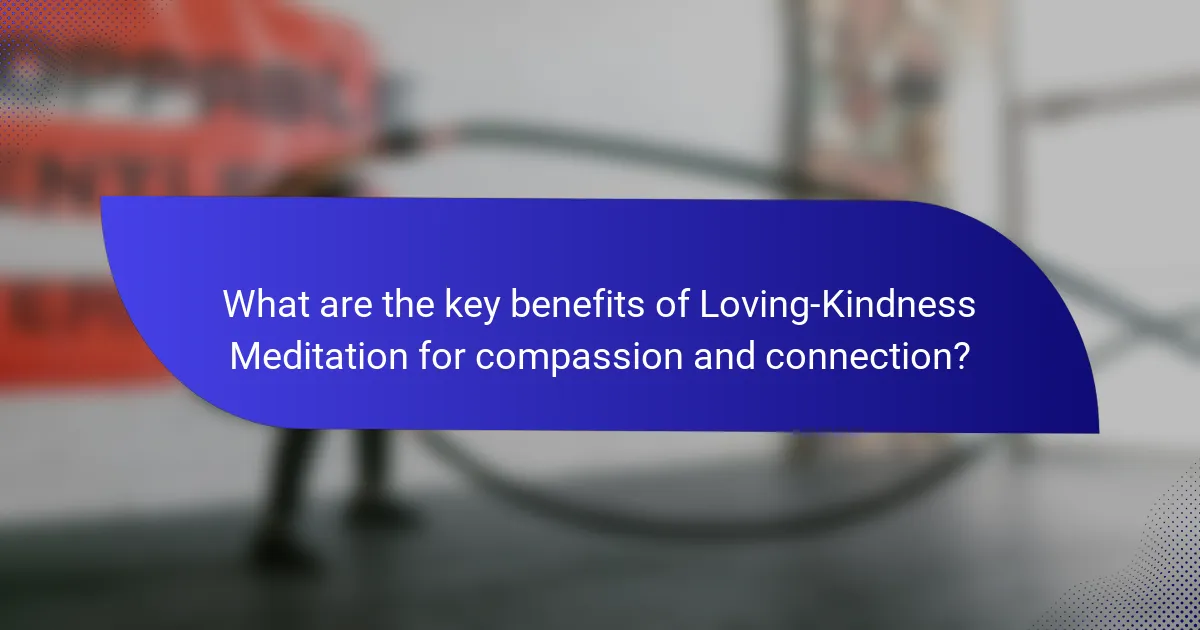
What are the key benefits of Loving-Kindness Meditation for compassion and connection?
Loving-Kindness Meditation enhances compassion and connection by fostering positive emotions and empathy. This practice encourages individuals to cultivate love and goodwill towards themselves and others, leading to stronger interpersonal relationships. Research indicates that regular practice can increase emotional resilience and reduce feelings of isolation. Participants often report improved mental well-being and a greater sense of community. Additionally, studies show that Loving-Kindness Meditation can activate brain regions associated with empathy and compassion, enhancing one’s ability to connect with others.
How does Loving-Kindness Meditation enhance emotional well-being?
Loving-Kindness Meditation significantly enhances emotional well-being by fostering compassion and connection. This practice encourages positive emotions, which can reduce anxiety and depression. Research indicates that individuals who engage in Loving-Kindness Meditation report increased feelings of social connection and improved overall life satisfaction.
Additionally, the meditation promotes self-compassion, enabling individuals to treat themselves with kindness during difficult times. This unique attribute contributes to resilience and emotional regulation, helping practitioners navigate stress more effectively. Regular practice can lead to lasting changes in emotional responses, enhancing interpersonal relationships and overall mental health.
Which psychological studies support the benefits of Loving-Kindness Meditation?
Research supports that Loving-Kindness Meditation enhances compassion and social connection. Studies show significant increases in positive emotions and empathy among participants. For instance, a study by Fredrickson et al. (2008) found that regular practice fosters greater feelings of social connection. Another study by Seppälä et al. (2013) demonstrated that Loving-Kindness Meditation can increase altruistic behavior. Additionally, a meta-analysis by Creswell (2017) indicated improvements in emotional well-being and interpersonal relationships. These findings highlight the psychological benefits of this meditation practice in enhancing compassion and connection.
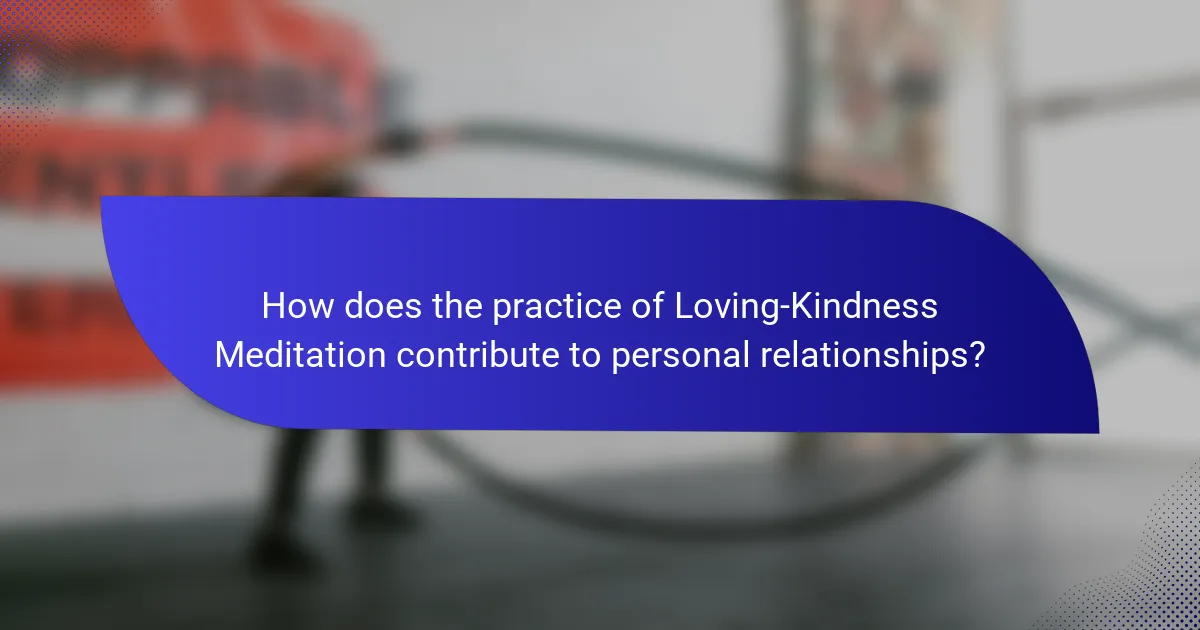
How does the practice of Loving-Kindness Meditation contribute to personal relationships?
Loving-Kindness Meditation significantly enhances personal relationships by fostering compassion and emotional connection. This practice encourages individuals to cultivate positive feelings towards themselves and others, leading to improved empathy. Research indicates that regular practitioners experience increased feelings of social connection and reduced feelings of isolation.
Additionally, Loving-Kindness Meditation promotes forgiveness and reduces negative emotions, which can be transformative in interpersonal dynamics. By focusing on goodwill and kindness, individuals often find themselves more open and responsive in their relationships. This shift in mindset can lead to stronger bonds and greater intimacy with loved ones.
Furthermore, the practice can enhance communication skills, allowing for more meaningful exchanges. As a result, people report feeling more understood and valued in their interactions. Overall, the benefits of Loving-Kindness Meditation create a ripple effect, enriching personal relationships through enhanced compassion and connection.
What role does empathy play in enhancing connections through Loving-Kindness Meditation?
Empathy significantly enhances connections through Loving-Kindness Meditation by fostering understanding and compassion. This practice encourages individuals to cultivate feelings of goodwill towards themselves and others. As a result, participants often experience improved emotional resilience and stronger interpersonal relationships. Research indicates that regular practice can lead to increased prosocial behavior, which further strengthens social bonds. Overall, the integration of empathy through Loving-Kindness Meditation creates a nurturing environment for deeper connections.
How can Loving-Kindness Meditation improve conflict resolution skills?
Loving-Kindness Meditation enhances conflict resolution skills by fostering empathy and compassion. Practicing this meditation helps individuals develop a deeper understanding of others’ perspectives, which is crucial during conflicts. Research shows that regular practitioners exhibit improved emotional regulation and conflict management abilities. This meditation promotes connection and reduces hostility, leading to more constructive conversations and resolutions. By cultivating a mindset of kindness, individuals can approach disagreements with a greater sense of patience and openness.
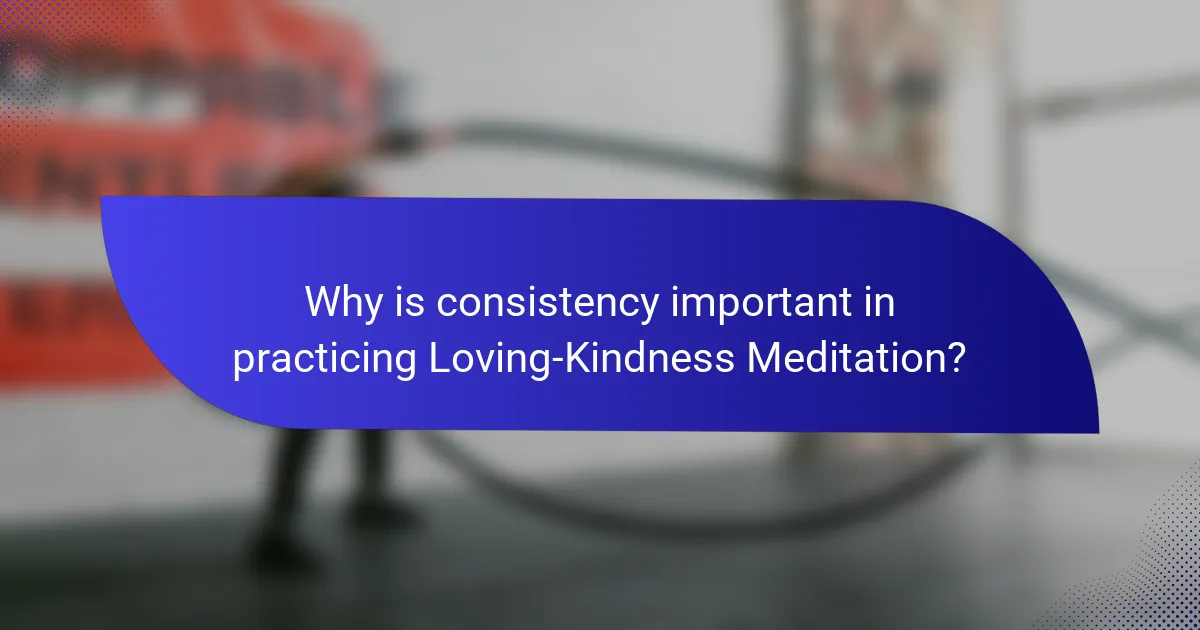
Why is consistency important in practicing Loving-Kindness Meditation?
Consistency in practicing Loving-Kindness Meditation is crucial for cultivating deeper compassion and connection. Regular practice reinforces the neural pathways associated with empathy, enhancing emotional resilience. Over time, consistent engagement leads to significant improvements in interpersonal relationships and overall well-being. Studies show that individuals who practice regularly report higher levels of compassion and lower levels of anxiety, highlighting the transformative power of this meditation.
What are effective ways to incorporate Loving-Kindness Meditation into daily routines?
To effectively incorporate Loving-Kindness Meditation into daily routines, practice it during moments of stillness. Start with a few minutes each day, gradually increasing the duration. Integrate it with existing habits, such as before meals or bedtime. Use guided meditations to enhance focus and engagement. Reflect on personal connections to deepen compassion.
How long should one practice Loving-Kindness Meditation to see benefits?
Practicing Loving-Kindness Meditation for at least 15 minutes daily can lead to noticeable benefits within a few weeks. Regular engagement fosters enhanced compassion and connection with oneself and others. Studies indicate that even short sessions can significantly improve emotional well-being and social connections. As a result, those who commit to this practice often experience a deeper sense of empathy and improved relationships.
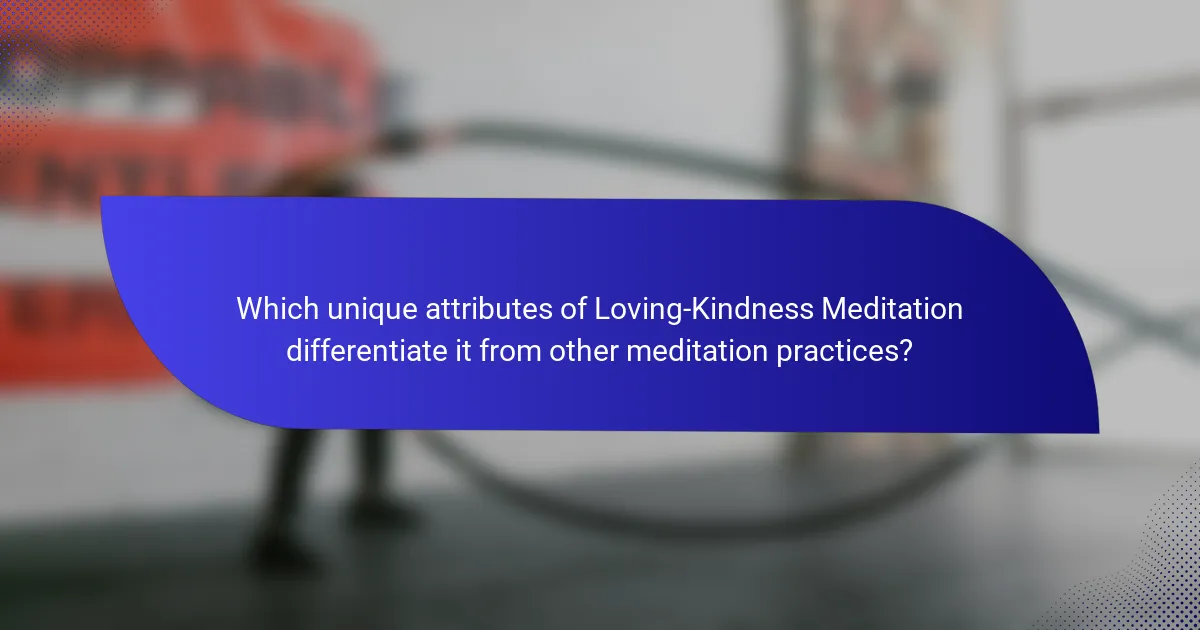
Which unique attributes of Loving-Kindness Meditation differentiate it from other meditation practices?
Loving-Kindness Meditation uniquely emphasizes the cultivation of compassion and connection through intentional phrases and visualizations. This practice fosters emotional resilience and enhances interpersonal relationships by promoting empathy. Unlike other meditation forms, it specifically targets the heart’s openness and loving attitudes. Practitioners often report increased feelings of social connection and reduced anxiety, distinguishing it from more traditional mindfulness techniques that focus primarily on awareness and presence.
How does Loving-Kindness Meditation address self-compassion?
Loving-Kindness Meditation fosters self-compassion by encouraging individuals to cultivate positive emotions towards themselves and others. This practice promotes empathy and reduces negative self-talk, enhancing emotional resilience. Studies show that participants often report increased feelings of self-acceptance and decreased anxiety, leading to a more compassionate mindset. By consistently practicing Loving-Kindness Meditation, individuals can develop a profound sense of connection with themselves and others, ultimately transforming their approach to self-compassion.
What makes the visualization techniques in Loving-Kindness Meditation distinct?
The visualization techniques in Loving-Kindness Meditation are distinct due to their focus on evoking compassion and connection. These techniques often involve mentally picturing loved ones and extending goodwill towards them, which enhances emotional bonding. This approach contrasts with other meditation forms that may emphasize mindfulness or awareness without the relational aspect. Additionally, the unique attribute of personalized visualization allows practitioners to tailor their experience, fostering deeper emotional resonance. Studies indicate that this method can significantly improve empathy levels and reduce feelings of isolation.
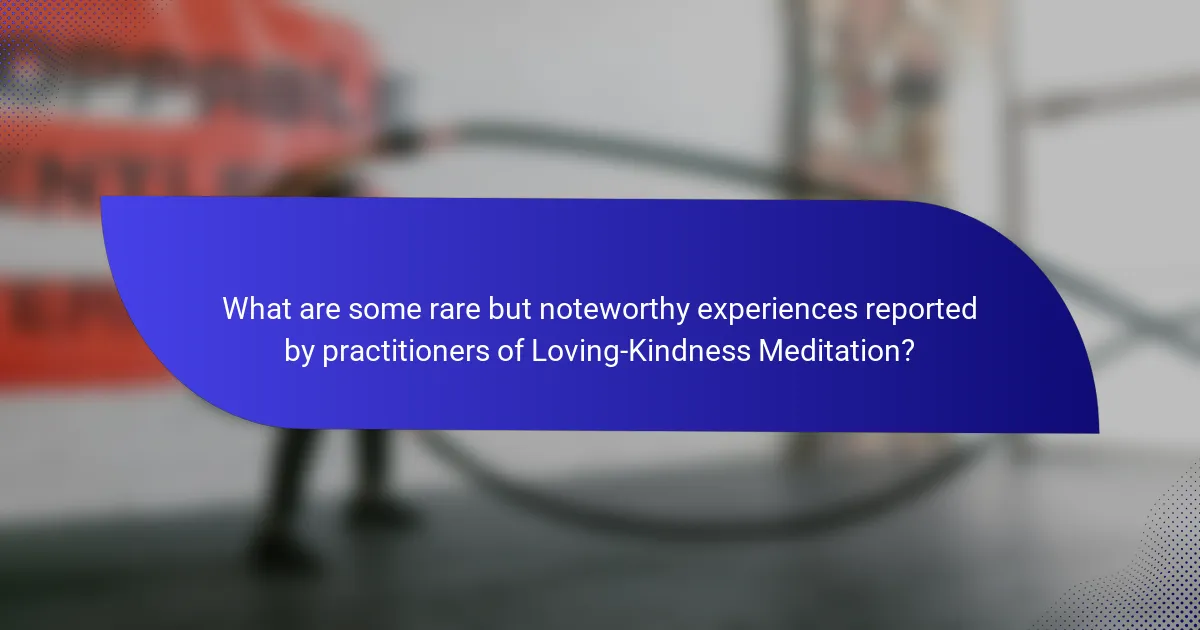
What are some rare but noteworthy experiences reported by practitioners of Loving-Kindness Meditation?
Practitioners of Loving-Kindness Meditation report rare experiences that enhance emotional resilience and foster profound connections. Some notable experiences include a heightened sense of empathy, spontaneous feelings of joy towards strangers, and a deepened appreciation for life’s simple moments. These experiences can lead to transformative shifts in interpersonal relationships and self-perception, promoting a unique attribute of unconditional compassion. As a result, individuals often describe a lasting impact on their overall well-being and social interactions.
How can Loving-Kindness Meditation lead to unexpected personal transformations?
Loving-Kindness Meditation can lead to profound personal transformations by fostering deep compassion and connection. Practitioners often experience increased empathy, reduced negative emotions, and enhanced social bonds. Research indicates that regular practice can significantly improve emotional well-being and interpersonal relationships. This meditation cultivates a unique attribute of self-acceptance, which can be rare in traditional mindfulness practices. As a result, individuals may find unexpected resilience and a greater sense of belonging in their communities.
What unique insights have practitioners gained from long-term Loving-Kindness Meditation?
Practitioners have gained profound insights into the transformative effects of Loving-Kindness Meditation on their emotional well-being. Long-term practice fosters a deeper sense of compassion and connection with oneself and others.
Research indicates that consistent engagement in this meditation enhances emotional resilience and reduces feelings of isolation. Participants report increased empathy and a greater ability to forgive, which positively influences interpersonal relationships.
Additionally, practitioners experience a unique attribute of heightened awareness towards their own suffering and that of others. This awareness cultivates a rare capacity for altruism, leading to more meaningful community involvement and social connections.
Overall, Loving-Kindness Meditation serves as a powerful tool for personal growth, promoting a culture of kindness and understanding in various social contexts.
What best practices should beginners follow to optimize their Loving-Kindness Meditation experience?
To optimize Loving-Kindness Meditation, beginners should focus on creating a calm environment, setting a clear intention, and practicing regularly. These practices enhance compassion and connection.
1. Create a calm environment: Choose a quiet space free from distractions to facilitate focus and relaxation.
2. Set a clear intention: Define your purpose for the meditation, such as fostering love for yourself and others.
3. Practice regularly: Consistency builds familiarity and deepens the meditation experience. Aim for daily sessions, even if brief.
4. Use guided meditations: Beginners may benefit from guided sessions to learn techniques and maintain focus.
5. Be patient: Progress takes time; allow yourself to grow without judgment.
6. Reflect on experiences: After each session, consider the emotions and thoughts that arose to deepen understanding.